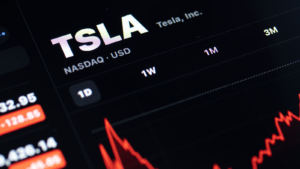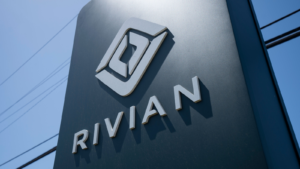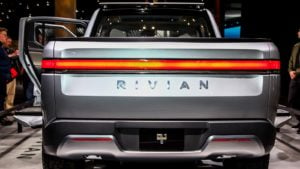The California-based automaker, with an assembly plant in Illinois, is going through an Electric Vehicle version of Death Valley. It needs to stay afloat long enough to build a new plant in Georgia, which it was forced to delay in March.
The plan is that the Georgia plant will, in 2027, deliver the R3. That’s a smaller, less expensive EV that might be competitive with what China is putting out right now.
Getting from here to there looked like a stretch in March. But is Tesla (NASDAQ:TSLA) making it easier?
The Tesla Backlash

Tesla’s second-quarter earnings report was not good. Growth slowed and earnings were way down. It was clear to those who heard its conference call that CEO Elon Musk is focused on things other than building cars.
America is falling out of love with Tesla. Musk’s behavior is being blamed. Personally, I think this is less with politics and Twitter than the Cybertruck, the Edsel of EVs.
All this has given Rivian a luster and an opportunity it didn’t have before. Price targets are being raised on the heels of Volkswagen (OTCMKTS:VWAGY) putting $5 billion into a joint venture for its various innovations.
That’s equity which, if properly leveraged along with $4.8 billion in current debt, could get Rivian to Georgia.
Georgia is what it’s all about.
Georgia on my Mind

Rivian has 2,000 acres in Social Circle, Georgia, on which it agreed to build a new plant with state help in 2021. It’s the biggest subsidy Gov. Brian Kemp has given any company. His political future is riding on it.
Assuming Rivian can build the plant, it will be within a few hours of two huge battery plants, one in Commerce and one in Ellabell, near Savannah. The U.S. Southeast is becoming a center of new battery technology, and batteries represent 40% of an EV’s cost.
Rivian will deliver its second-quarter report on August 6, and analysts are hopeful. But Rivian is still a small company. It delivered just 13,790 vehicles during the second quarter.
When Rivian reports its numbers, it will also tell analysts about the mix of its production and deliver some guidance for the rest of the year. The company is continuing to deliver on its order of 100,000 trucks for Amazon.Com (NASDAQ:AMZN), originally placed five years ago. At last check 10,000 had been delivered, and the reviews I get from drivers are very good. Amazon recently dropped its exclusivity on the design.
Reviews on the latest versions of Rivian’s R1 truck and SUV are positive. The second generation of its vehicles can go up to 420 miles on a charge, and they’re simpler. They also use the same charging port as the Tesla, and can add 140 miles of range in just 30 minutes.
The Bottom Line on Rivian Stock

If Elon Musk is the Henry Ford of American EVs, Rivian founder R.J. Scaringe could become the Walter Chrysler. Chrysler became Ford’s primary competitor in the 1920s, with its Touring Car outshining anything Ford delivered.
Scaringe is a respected car guy and will likely remain one. He convinced Amazon, Ford Motor (NYSE:F), the state of Georgia, and now Volkswagen to invest in him.
Rivian is delivering a good EV. While the company still hasn’t gotten through the EV Death Valley and has yet to show a profit, it may have enough orders to do it. At its July 26 closing price, it’s selling at barely three times sales, against more than seven times sales for Tesla.
Tesla’s mistakes have made Rivian stock a worthwhile speculation.
On the date of publication, the responsible editor did not have (either directly or indirectly) any positions in the securities mentioned in this article.
As of this writing, Dana Blankenhorn had a LONG position in AMZN. The opinions expressed in this article are those of the writer, subject to the InvestorPlace.com Publishing Guidelines.
Dana Blankenhorn has been a financial and technology journalist since 1978. He is the author of Technology’s Big Bang: Yesterday, Today and Tomorrow with Moore’s Law, available at the Amazon Kindle store. Write him at [email protected], tweet him at @danablankenhorn, or subscribe to his free Substack newsletter.
Dana Blankenhorn has been a financial and technology journalist since 1978. He is the author of Technology’s Big Bang: Yesterday, Today and Tomorrow with Moore’s Law, available at the Amazon Kindle store. Tweet him at @danablankenhorn, connect with him on Mastodon or subscribe to his Substack.
